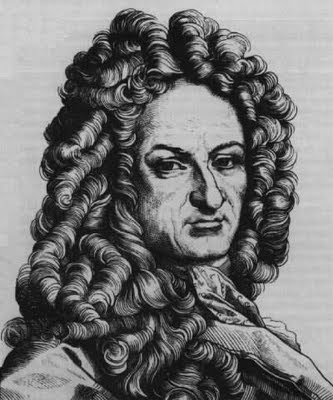Susan Neiman explains our next theodicy - "The Best of All Possible Worlds", as proposed by Leibniz (below) - the video doesn't get going for about 30 seconds.

Candide grows up in the home of Baron Thunder-ten-tronckh in the German province of Westphalia. His tutor, Dr. Pangloss, teaches him that their world is the best of all possible worlds, and everything that transpires in this world is for the best. Candide accepts Dr. Pangloss’s teachings as absolute truth. Candide admires the Baron’s beautiful daughter, Cunégonde, and they share an innocent kiss after dinner one evening.
Cunégonde’s father sees the young lovers kiss, and he immediately banishes the Candide from his home. This incident begins a miraculous series of misfortunes for all of the novel’s characters. Candide is conscripted into the army where he is abused (to a nearly absurd degree) and almost executed before escaping to Holland. In Holland, he is pitied by an Anabaptist who apprentices him and offers him shelter. Soon after, Candide runs into Dr. Pangloss, who has contracted syphilis and is now a poor beggar on the street. Pangloss explains that the Baron, Baroness, Cunégonde, and her brother were disemboweled and killed by soldiers. Pangloss is cured of his illness, and he departs with the Anabaptist and Candide for Lisbon. En route, they are shipwrecked, the Anabaptist dies, and Candide and Pangloss hardly reach shore before a massive earthquake strikes.
In Lisbon, Pangloss is executed for his heretical views and Candide is beaten for approving of them. By a stroke of fortune, Candide is reunited with Cunégonde, who survived the murder attempt described by Pangloss and is now a servant and mistress to two men. But she’s been staving off the sexual advances of the men. Candide kills both of the men and the group escapes, along with their new companion, an old woman, to Buenos Aires. There, the governor of Buenos Aires proposes to Cunégonde, and wary of her financial situation, she accepts.
Meanwhile, the authorities pursue Candide for murder, so he and his faithful servant, Cacambo, escape to a Jesuit camp. The Colonel at the camps turns out to be Cunégonde’s brother, who also survived the disembowelment attack, but has suffered an unimaginable slew of misfortunes. The Colonel learns that Cunégonde is alive and that Candide intends to marry her. Although Candide has saved his sister’s life, he still disapproves of the marriage because of Candide’s inferior social status. Candide responds by stabbing him.Questions:
Write a short summary of the main points of the "Best of Possible Worlds" Theodicy (use the video)
What do you think Voltaire thought of the theodicy?
Who is Doctor Pangloss meant to represent and what do you think Leibniz thought of him?
What's the 'moral' of Candide?
Here's a picture of Doctor Pangloss:
